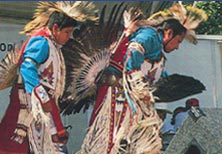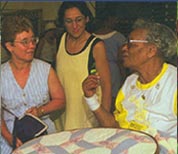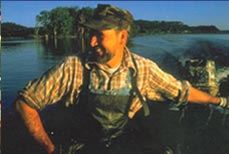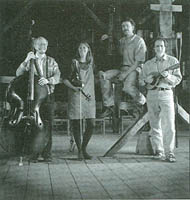






| Resources | ||||||
|
||||||
| Learning Guide |
| 1. Social Studies |
| 2. Language Arts |
| 3. Music |
| 4. Art |
| 5. Special: Multi-Disciplinary, Culminating Activities |
|
Beth Hoben Rotto: vocals and fiddle Swelling shortly after Iowa became a state in 1846, major waves of emigration from the Scandinavian countries began to peak by the turn of the century. Today, the state's Scandinavian population is primarily Danish and Norwegian in its ethnic roots, and northeastern Iowa is particularly noted for its Norwegian heritage. Music has always been a part of the culture of the area, and the Foot-Notes are a charming Scandinavian-American string band from Decorah. Their vibrant performances at community dances are significant catalysts for fostering an appreciation for traditional dance music within the area's Norwegian-American community. Although aficionados of old-time fiddling across the country are discovering the appeal of Scandinavian polkas, schottisches, quadrilles, and waltzes, Scandinavian old-time tunes are rarely performed as integral components of community life in America. The music of Foot-Notes is an exception. Through numerous venues—including regular performances at dances attended by young and old alike—the band is making significant contributions to Iowa's cultural vitality.Beth Hoven Rotto is the group's leader. She picked up many of her fiddle tunes from fellow musicians in the Decorah area, through apprenticeships with the Scandinavian-American fiddler Dick Rees, with dance fiddler Bill Sherburne, and with Gail Heil, as well as from recordings. The "Emigrant Waltz" is a ballad written from a Norwegian's perspective, its lyrics providing a poignant caveat against wholesale acceptance of the American Dream. "Henry Storhoff's Schottische" is a lively dance that is popular in the Decorah area. Beth Rotto learned the melody from Bill Sherburne, a fiddler from Spring Grove, Minnesota. Additional recordings: Foot-Notes, First Steps 1992; Foot-Notes, Highlandville Dance 1993. Rt. 2 Box 144, Decorah, Iowa 52101 319-383-9315. Lyrics: The tune is traditional and the lyrics come from the broadsheet ballad published in the former Christiania, Norway —now called Oslo: En dag, da jeg spaserede nede ved strand/ da så jeg en damper, som /agde fra land/ med masser af folk, både kvinder og mænd/som agtet at reise til Amerika hen, for at samle sig "Guld"/—hvis lykken er huld—/med hakke og spade i arbeidets muld. Nede på bryggen var trængselen stor/thi forældre, kjæreste, søster og bror/de havde jo sine på damperens dæk/som kanske for altid ifra dem drog væk/De vifted og græd mens tårer randt ned/et farvel, der bæved om munden så bleg. Årlgårs reiser en masse mod vest/som tror, at den nye verden er bedst/som tror, at de letvindt kan skaffe sig brød/og leve behagelig, befriet fra nød/Det hænder nok så,at man rigdom kan få/men mange må også der fattige gå. Bliv hjemme og hjælp til at løfte vort land/råder jeg enhver, både kvinde og mand/det er ei så fattigt, som mange vist tror/og dertil det skjønneste land på vor jord/med skoge og fje/d/og græsbakkeheld/med rislende bække og fossestrygs væ/d. Men reiser du end til Amerika hen/og skulde du også b/i Fortunas ven/ved at hente dig kundskab om arbiedets magt/da håber jeg onsket i dig blir vakt:/At skue du kan A broadsheet ballad from Helge Schu/tz's Printing House, Christiania ( Oslo) Translated by Inger Lovkrona: One day when / walked along the strand/1 saw a steamer put out from land/Crowded with people, both women and men/ Who aimed to go to America away/To gather their gold/—if fate was kind—/ With a pickax and a turf spade. On the pier, the crowds were huge/Parents, beaus, sisters, and brothers/Their beloveds were on board the steamer's deck/They all might be gone away forever/They waved and cried farewell, with tears rolling down the cheeks/They waved and cried and tearfully said farewell/With pale and quivering lips. Every year many people go west/Those who believe the New World is the best/ Those who think they will easily earn bread/And live a comfortable life free from need/For some it comes true/A fortune to gain/But for some the poverty remains. Stay at home and help to build up our country/I advise both women and men/It is not as poor as you think/And besides, it is the most beautiful country on the earth/With forest and mounts and green hills/With dancing creeks and majestic streaming waterfalls. You who all the same choose to go to America away/And you who become a friend of good fortune/By learning the power of work/1 hope in you will arise/A desire to see the shores of home/And to give your strength to your beloved native country. |
Previous |
| | Next |
| smithsonian institution |
 |
pioneer hi-bred international, inc. |
iowa sesquicentennial commission |
 |
iowa arts council |
